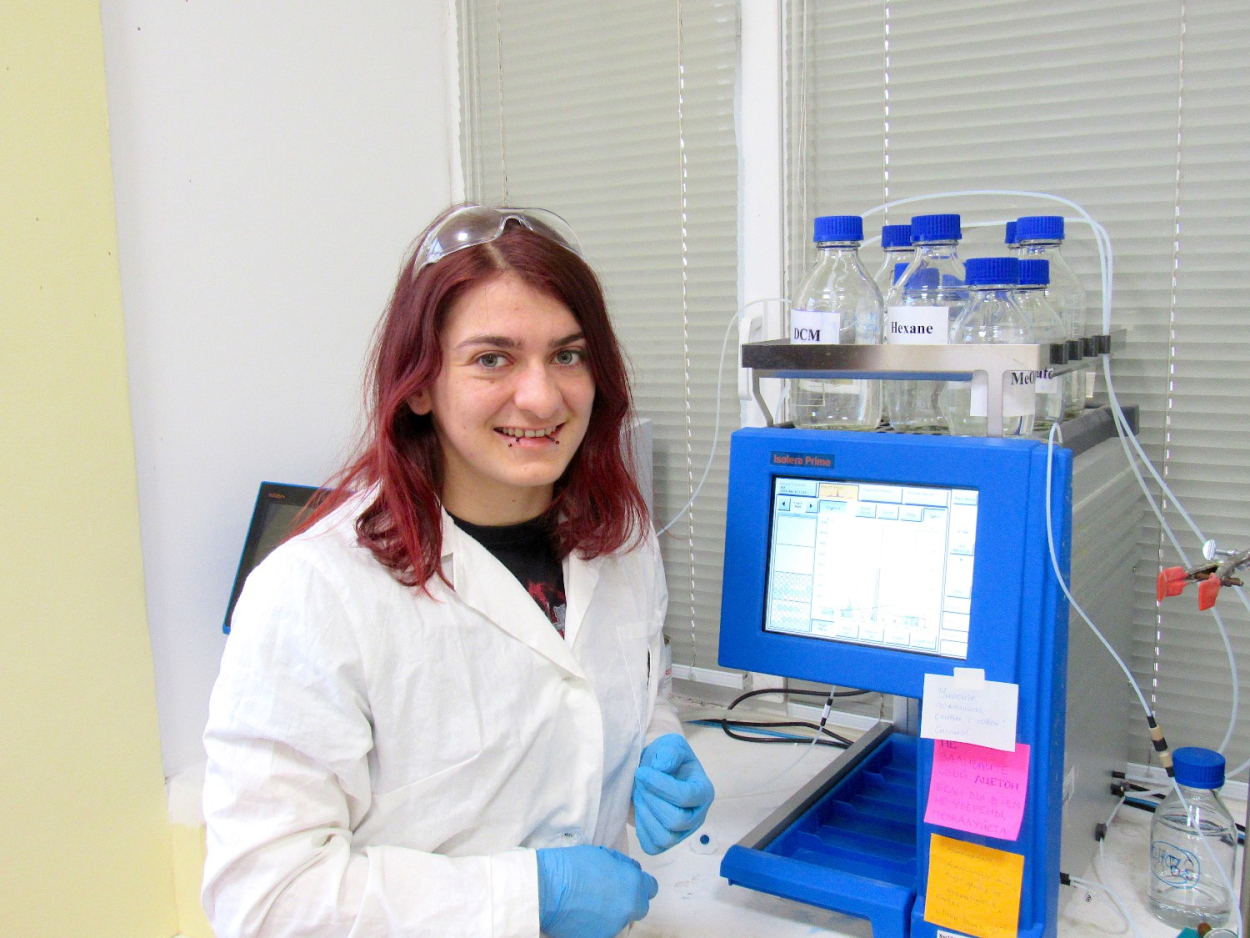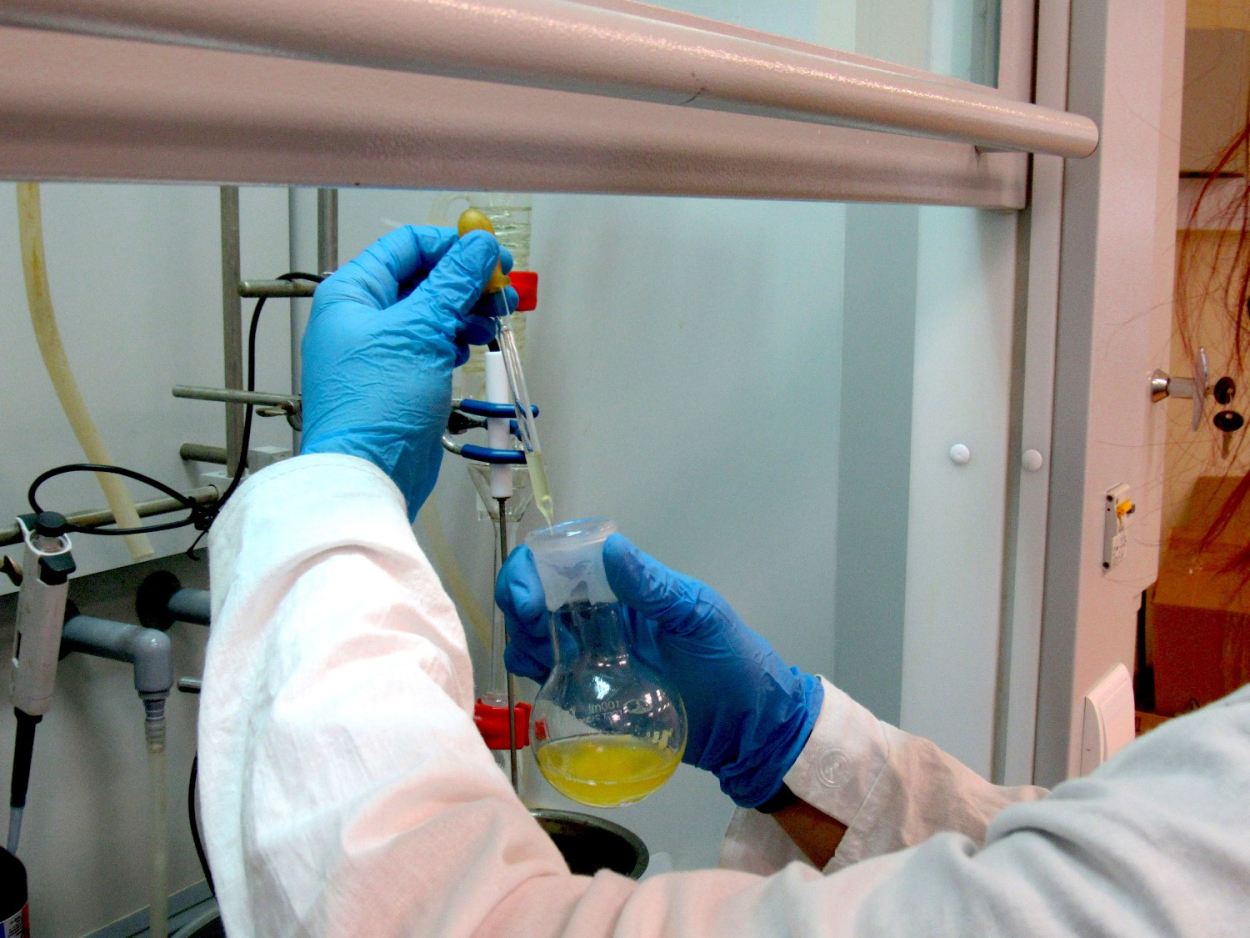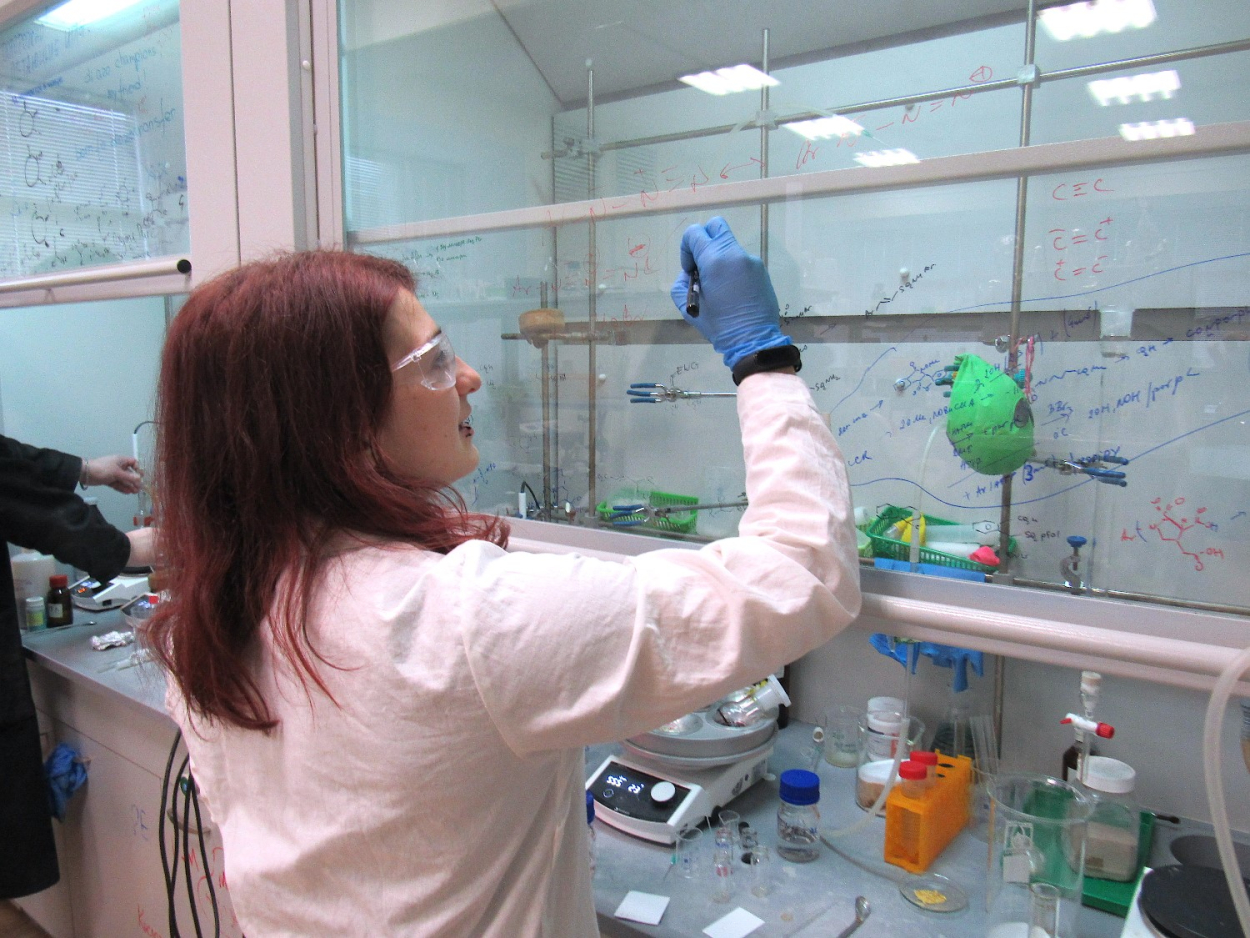Chemical Pharmacology, pole acrobatics and Russian friends: how a German student found time for it all at SPbU

A student from Germany, Judy Synofzik’s internship at the Chemical Pharmacology laboratory of the SPbU Institute of Chemistry has come to an end in March. Luckily, we got a chance to talk to her before she set off back to Germany for an industry internship hoping to return soon and start a PhD at St Petersburg University. Judy spent a very productive year in Russia publishing articles in The Journal of Organic Chemistry of the American Chemical Society, making Russian friends and taking the first place in the International acrobatic competition.
Judy, it’s great to get a chance to talk to you because we heard that your SPbU story is very exciting! You came to St Petersburg University on exchange from Germany to do an internship in Chemical Pharmacology and worked on a really interesting project. As far as I know, you enjoyed it so much that decided to stay a bit longer to complete your Master thesis here, at Mikhail Krasavin research group. Could you tell a little about your research and what lead you to Russia in the first place?
While being a Bachelor in Chemistry student in my university in Germany, I got interested in learning another language just for fun. Initially, I wanted to study Turkish but at that time I liked a guy from Russia, who told me: “Why don’t you learn Russian, I would help you?” So, I wasn’t really interested in the Russian language then, I was more interested in that guy but that’s how I decided to go to my first Russian class. I learned just the Cyrillic alphabet then and nothing more? In my Master’s, we could choose where to spend a semester abroad and, since I already knew the Cyrillic alphabet, I thought “why not go to Russia?”
I came to St Petersburg University to do an internship in the Chemical Pharmacology laboratory. During the time here, I was researching β-Lactam synthesis. The first application for this research, and the most famous one, is antibiotics. The structures that I synthesize have the same core as penicillin, for example, and only the periphery is changed. In the lab, we discovered a way to synthesize them very directly, I personally was researching which substrates can be used in this reaction. Antibiotics is only one of the ways how these structures can be used, while in the recent years many more applications have been discovered like anti-malaria and targeted drug delivery, which helps to reduce side effects because you can bring the drug exactly to where it is needed in the body. Therefore, you need a lower dose and have less side-effects. That was what I was doing in the first semester. After spending two months back home I tried to organize to come back to St Petersburg University to write my Master thesis here, and luckily, it worked!

Are you enjoying your experience?
The scientific level here is very-very high, I’m impressed by how smart the people are – both professors and fellow colleagues. My supervisor Olga Bakulina is amazing. When I came here a year ago, we were just talking about Chemistry and I felt really challenged to keep up with this level of conversation.
I’m researching a very interesting topic, it’s much more interesting than what the working groups at my home university are dealing with. Also, I love my SPbU working group. The colleagues are so nice, I enjoy spending time with them personally and also on a scientific level. I feel very comfortable in the lab and wish to return to St Petersburg University for my PhD.
Actually, there is quite a big difference between my experience in SPbU and in Germany. In Germany, almost everyone who applies to study Chemistry can get into the course. But the exams in the first semester are already very hard, that way all the people who are not really trying will get kicked out. That system is the reason why we start with a huge amount of new students every year, moreover, professors know that during the years more and more students are going to be expelled. That’s why I have the impression that they don’t really care much about you as a student, you are just one out of a thousand. You only get a chance to work on side projects in the lab in Germany, because the teachers know that you will be there just for 4-6 weeks.
While in St Petersburg people are actually much more caring about how I study, whether I understand what I do. The communication with a supervisor in Germany always feels like a situation of examination, they want to test if you know what will happen next in the reaction. In SPbU, I feel like my professors don’t try to test me all the time, they are just explaining the content. What is more, there is no hierarchy here, you can ask anyone in the lab and it doesn’t matter if he is a Bachelor student, or a Master, or a PhD.
In Germany, publishing scientific articles is seen as very important. But, for the most cases, it is a very individual process there: usually, the article will have two authors at most, if someone is working on a topic, no one else tends to interfere. And here, if I’m doing a reaction, and someone needs the same product for an article, I’ll just cook more and share it. My colleagues in Russia are not that focused on the attitude: “I will write my own article, this will be good for my career”, but instead they are working together and helping each other a lot. So, in the end there will be not two but five names on an article, but that also means there will be five times more papers – it's good for everyone.
Could you comment a bit on the facilities? is the equipment sufficient for the research you are working on?
It is pretty comparable to ours in Germany, I think. Many people in Germany have asked me “Why do you go to Russia, when everyone wants to go to the USA or Sweden where the industry is funding the research?” There is this image that Russia is behind in terms of Chemistry. But that is so not true! The people here are extremely competent, the equipment is good, and I can carry out any kind of research.
Are you planning to apply for an internship or a job position in the future?
Yes, I would like to try to get an internship at Bayer. The main reason for it is that Bayer gives grants for study projects abroad, I would like to use this grant for a PhD at St Petersburg University. Bayer representatives have shared with me that Russia is a big market for them, so at first, I searched for open positions here in Russia. However, Bayer in Russia is not looking for a synthetic chemist at the moment, therefore, I’ll do my internship in their Medical Chemistry research department in Germany and try to figure out the best way to apply for funding for further research at SPbU.
You are speaking Russian perfectly now. How did you learn the language?
The main way how I learned Russian was through sports! When I came here, I started going to pole acrobatics class. However, nobody spoke English in the studio, so I studied Russian by dancing. The first things I learned were actually the names of body parts. When I didn’t speak any Russian yet and couldn’t communicate with anyone, somehow the trainer and I understood each other from the first lesson very well without words. Now we are very close friends, we live near each other and spend all the free time together.

How do you find St Petersburg?
St Petersburg is such a great city! It’s very Russian on the one side, but has all the European conveniences on the other. I find Russian people much more open than the German ones, as soon as they notice that you are trying to speak Russian, their eyes glow and their hearts open up. All of my friends here are Russian.
My day is usually busy 24 hours, I’m never sitting at home and doing nothing, but I love it this way. Every time I get to go out in St Petersburg, I’m not doing much tourist stuff, I just love walking around, especially by the water.
Do you have any favorite places? Except for your pole acrobatic studio?
Yes, there is another studio?
Any final advice for people coming to St Petersburg?
They should know at least the Cyrillic alphabet in advance. And just be open and take everything as it comes!

